第五章形容词(思维导图+知识梳理+好题精炼)2022-2023初中英语中考语法归纳
文档属性
| 名称 | 第五章形容词(思维导图+知识梳理+好题精炼)2022-2023初中英语中考语法归纳 | 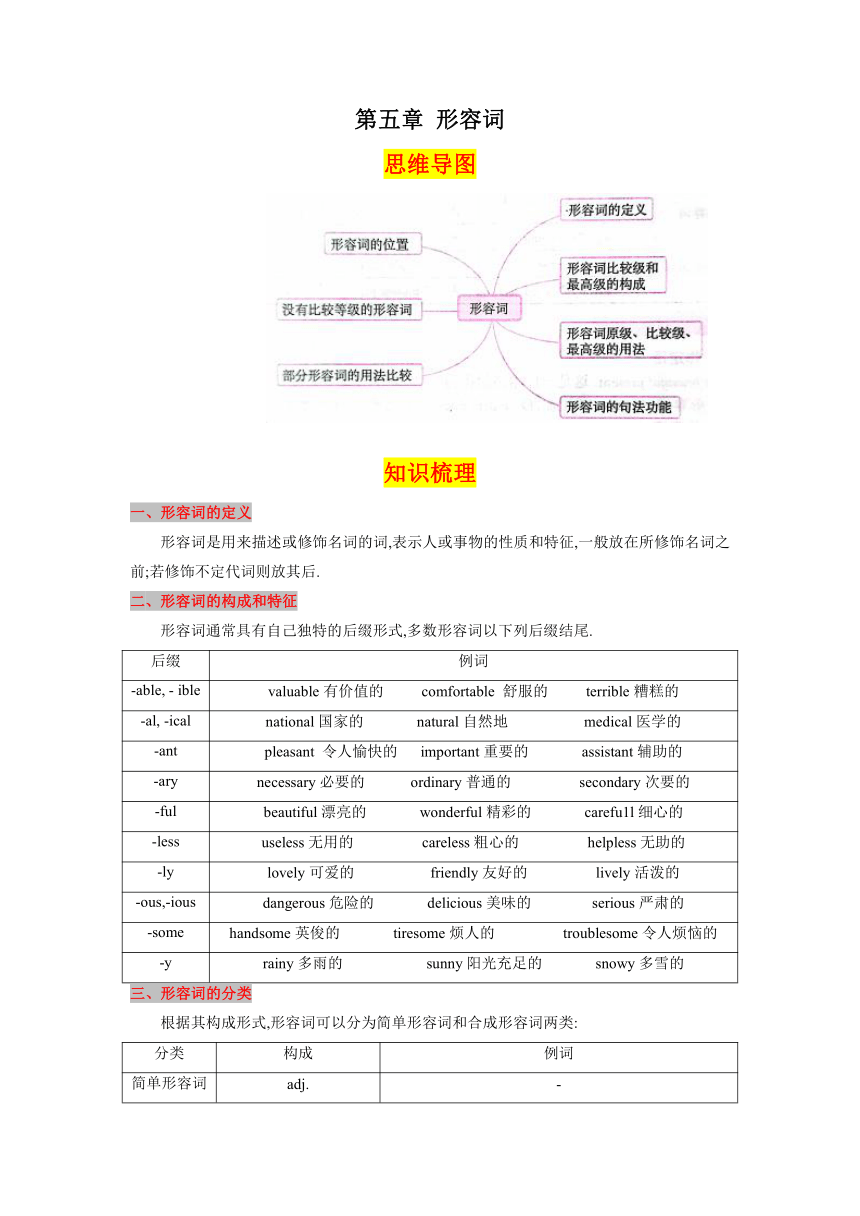 | |
| 格式 | docx | ||
| 文件大小 | 131.9KB | ||
| 资源类型 | 教案 | ||
| 版本资源 | 通用版 | ||
| 科目 | 英语 | ||
| 更新时间 | 2023-04-04 07:07:41 | ||
图片预览

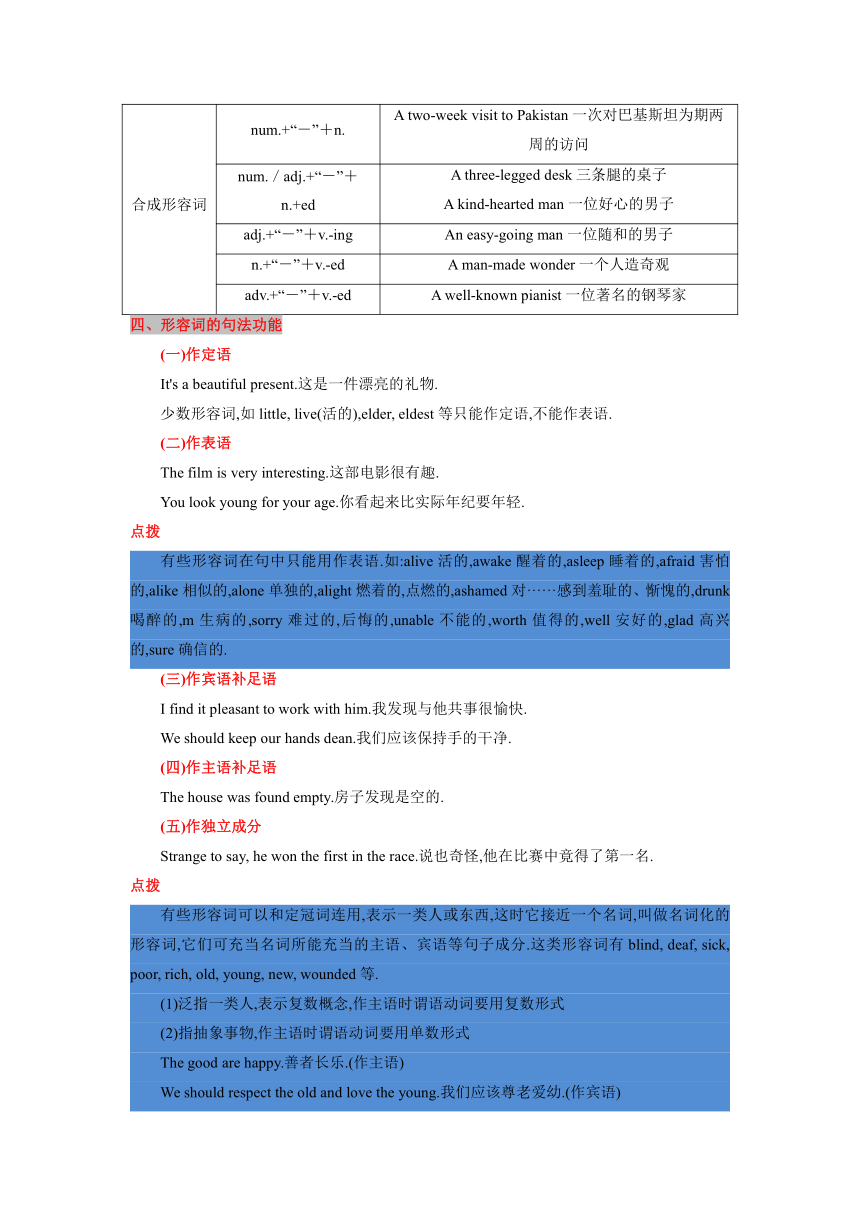
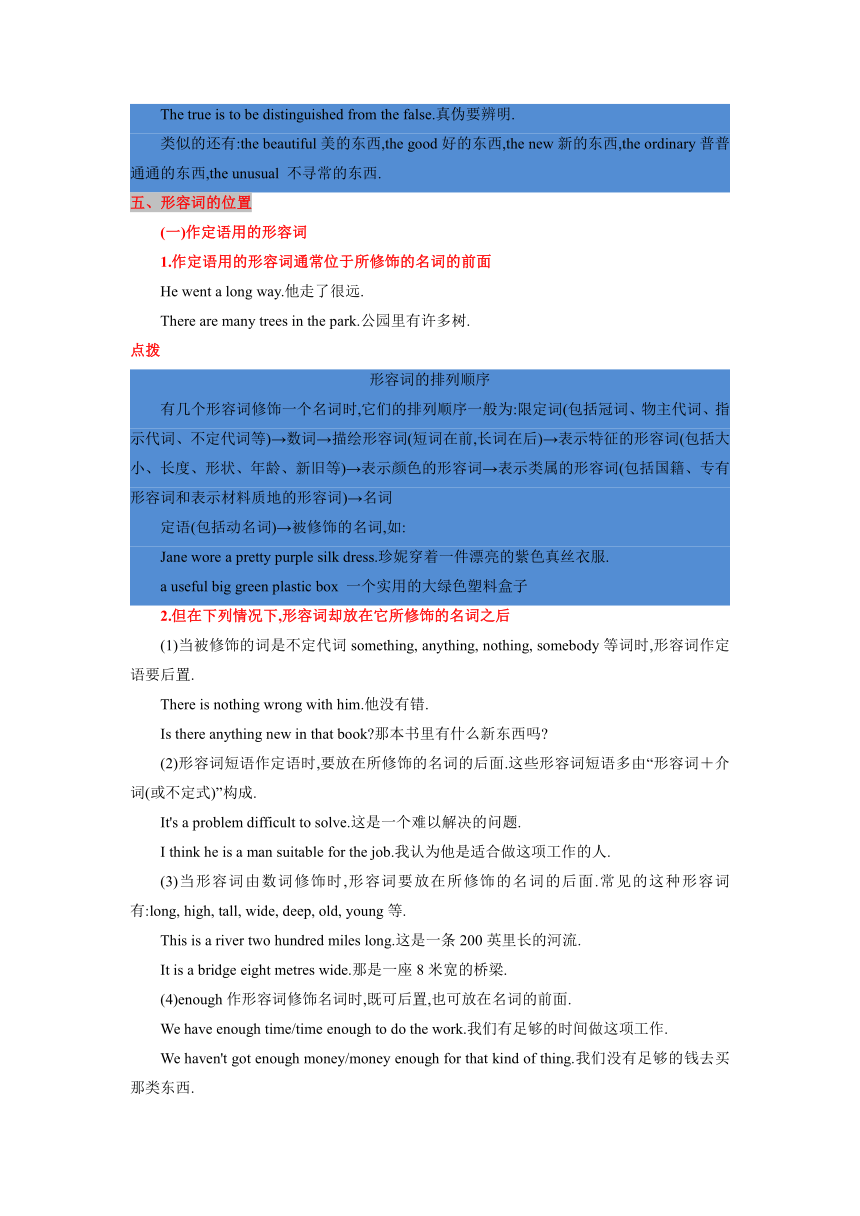
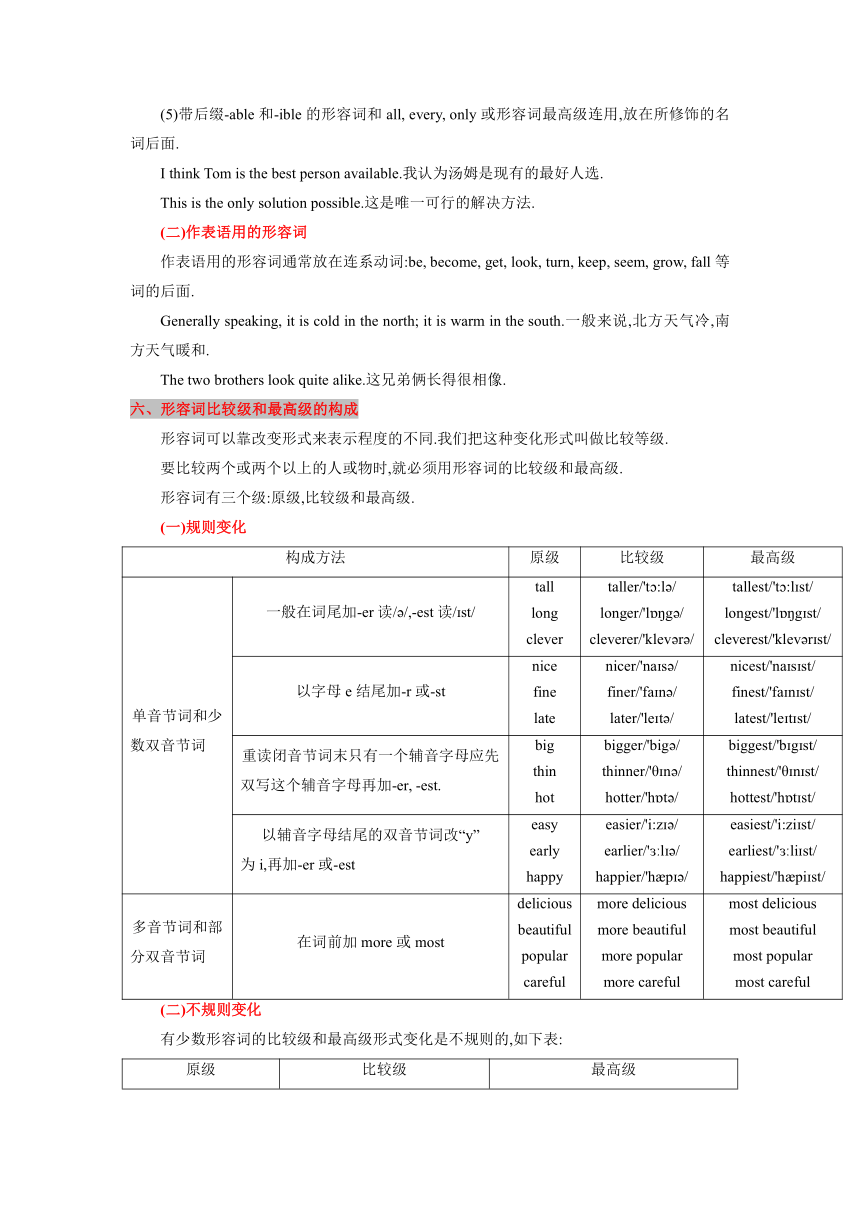
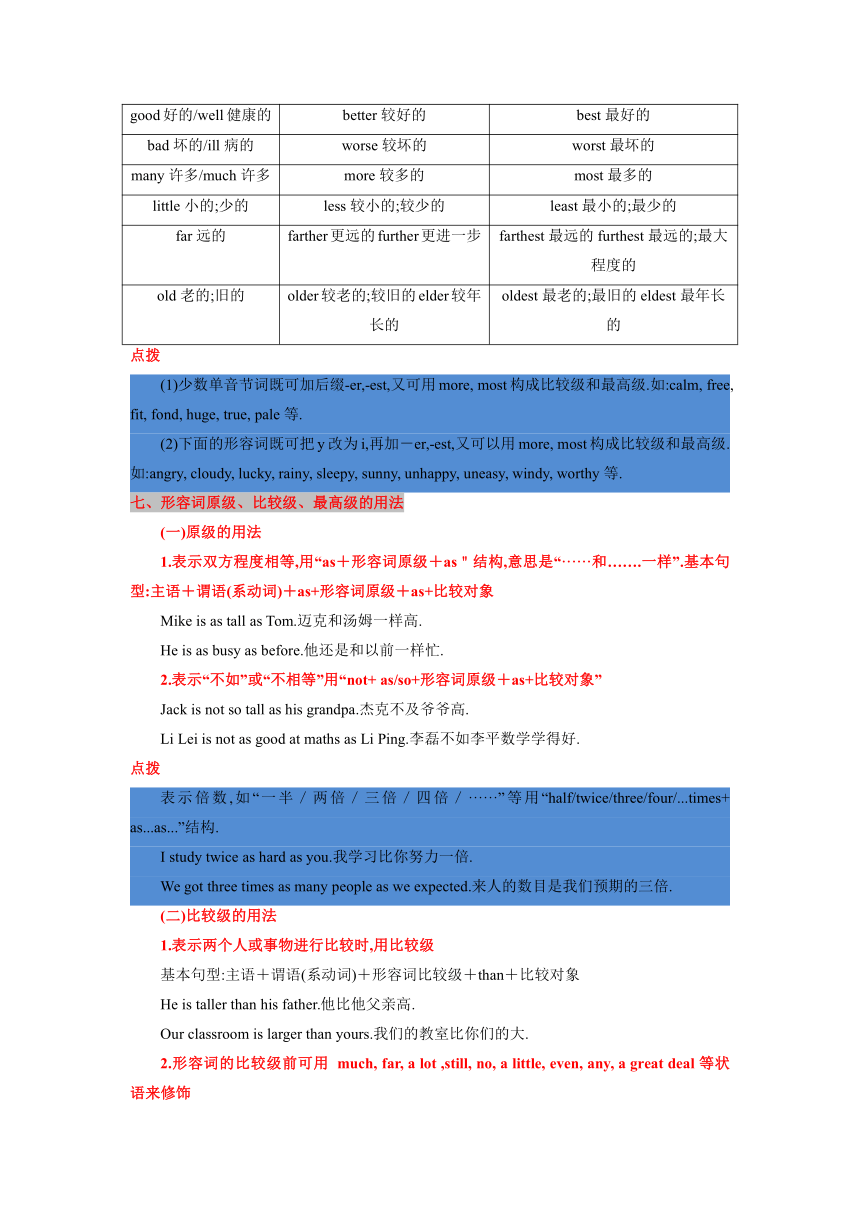
文档简介
第五章 形容词
思维导图
知识梳理
一、形容词的定义
形容词是用来描述或修饰名词的词,表示人或事物的性质和特征,一般放在所修饰名词之前;若修饰不定代词则放其后.
二、形容词的构成和特征
形容词通常具有自己独特的后缀形式,多数形容词以下列后缀结尾.
后缀 例词
-able, - ible valuable有价值的 comfortable 舒服的 terrible糟糕的
-al, -ical national国家的 natural自然地 medical医学的
-ant pleasant 令人愉快的 important重要的 assistant辅助的
-ary necessary必要的 ordinary普通的 secondary次要的
-ful beautiful漂亮的 wonderful精彩的 carefu1l细心的
-less useless无用的 careless粗心的 helpless无助的
-ly lovely可爱的 friendly友好的 lively活泼的
-ous,-ious dangerous危险的 delicious美味的 serious严肃的
-some handsome英俊的 tiresome烦人的 troublesome令人烦恼的
-y rainy多雨的 sunny阳光充足的 snowy多雪的
三、形容词的分类
根据其构成形式,形容词可以分为简单形容词和合成形容词两类:
分类 构成 例词
简单形容词 adj. -
合成形容词 num.+“-”+n. A two-week visit to Pakistan一次对巴基斯坦为期两周的访问
num./adj.+“-”+n.+ed A three-legged desk三条腿的桌子 A kind-hearted man一位好心的男子
adj.+“-”+v.-ing An easy-going man一位随和的男子
n.+“-”+v.-ed A man-made wonder一个人造奇观
adv.+“-”+v.-ed A well-known pianist一位著名的钢琴家
四、形容词的句法功能
(一)作定语
It's a beautiful present.这是一件漂亮的礼物.
少数形容词,如little, live(活的),elder, eldest等只能作定语,不能作表语.
(二)作表语
The film is very interesting.这部电影很有趣.
You look young for your age.你看起来比实际年纪要年轻.
点拨
有些形容词在句中只能用作表语.如:alive活的,awake醒着的,asleep睡着的,afraid害怕的,alike相似的,alone单独的,alight燃着的,点燃的,ashamed对······感到羞耻的、惭愧的,drunk喝醉的,m生病的,sorry难过的,后悔的,unable不能的,worth值得的,well安好的,glad高兴的,sure确信的.
(三)作宾语补足语
I find it pleasant to work with him.我发现与他共事很愉快.
We should keep our hands dean.我们应该保持手的干净.
(四)作主语补足语
The house was found empty.房子发现是空的.
(五)作独立成分
Strange to say, he won the first in the race.说也奇怪,他在比赛中竟得了第一名.
点拨
有些形容词可以和定冠词连用,表示一类人或东西,这时它接近一个名词,叫做名词化的形容词,它们可充当名词所能充当的主语、宾语等句子成分.这类形容词有blind, deaf, sick, poor, rich, old, young, new, wounded等.
(1)泛指一类人,表示复数概念,作主语时谓语动词要用复数形式
(2)指抽象事物,作主语时谓语动词要用单数形式
The good are happy.善者长乐.(作主语)
We should respect the old and love the young.我们应该尊老爱幼.(作宾语)
The true is to be distinguished from the false.真伪要辨明.
类似的还有:the beautiful美的东西,the good好的东西,the new新的东西,the ordinary普普通通的东西,the unusual 不寻常的东西.
五、形容词的位置
(一)作定语用的形容词
1.作定语用的形容词通常位于所修饰的名词的前面
He went a long way.他走了很远.
There are many trees in the park.公园里有许多树.
点拨
形容词的排列顺序
有几个形容词修饰一个名词时,它们的排列顺序一般为:限定词(包括冠词、物主代词、指示代词、不定代词等)→数词→描绘形容词(短词在前,长词在后)→表示特征的形容词(包括大小、长度、形状、年龄、新旧等)→表示颜色的形容词→表示类属的形容词(包括国籍、专有形容词和表示材料质地的形容词)→名词
定语(包括动名词)→被修饰的名词,如:
Jane wore a pretty purple silk dress.珍妮穿着一件漂亮的紫色真丝衣服.
a useful big green plastic box 一个实用的大绿色塑料盒子
2.但在下列情况下,形容词却放在它所修饰的名词之后
(1)当被修饰的词是不定代词something, anything, nothing, somebody等词时,形容词作定语要后置.
There is nothing wrong with him.他没有错.
Is there anything new in that book 那本书里有什么新东西吗
(2)形容词短语作定语时,要放在所修饰的名词的后面.这些形容词短语多由“形容词+介词(或不定式)”构成.
It's a problem difficult to solve.这是一个难以解决的问题.
I think he is a man suitable for the job.我认为他是适合做这项工作的人.
(3)当形容词由数词修饰时,形容词要放在所修饰的名词的后面.常见的这种形容词有:long, high, tall, wide, deep, old, young等.
This is a river two hundred miles long.这是一条200英里长的河流.
It is a bridge eight metres wide.那是一座8米宽的桥梁.
(4)enough作形容词修饰名词时,既可后置,也可放在名词的前面.
We have enough time/time enough to do the work.我们有足够的时间做这项工作.
We haven't got enough money/money enough for that kind of thing.我们没有足够的钱去买那类东西.
(5)带后缀-able和-ible的形容词和all, every, only或形容词最高级连用,放在所修饰的名词后面.
I think Tom is the best person available.我认为汤姆是现有的最好人选.
This is the only solution possible.这是唯一可行的解决方法.
(二)作表语用的形容词
作表语用的形容词通常放在连系动词:be, become, get, look, turn, keep, seem, grow, fall等词的后面.
Generally speaking, it is cold in the north; it is warm in the south.一般来说,北方天气冷,南方天气暖和.
The two brothers look quite alike.这兄弟俩长得很相像.
六、形容词比较级和最高级的构成
形容词可以靠改变形式来表示程度的不同.我们把这种变化形式叫做比较等级.
要比较两个或两个以上的人或物时,就必须用形容词的比较级和最高级.
形容词有三个级:原级,比较级和最高级.
(一)规则变化
构成方法 原级 比较级 最高级
单音节词和少 数双音节词 一般在词尾加-er读/ /,-est读/ st/ tall long clever taller/'t :l / longer/'l g / cleverer/'klev r / tallest/'t :l st/ longest/'l g st/ cleverest/'klev r st/
以字母e结尾加-r或-st nice fine late nicer/'na s / finer/'fa n / later/'le t / nicest/'na s st/ finest/'fa n st/ latest/'le t st/
重读闭音节词末只有一个辅音字母应先 双写这个辅音字母再加-er, -est. big thin hot bigger/'big / thinner/'θ n / hotter/'h t / biggest/'b g st/ thinnest/'θ n st/ hottest/'h t st/
以辅音字母结尾的双音节词改“y” 为i,再加-er或-est easy early happy easier/'i:z / earlier/' l / happier/'h p / easiest/'i:zi st/ earliest/' li st/ happiest/'h pi st/
多音节词和部 分双音节词 在词前加more或most delicious beautiful popular careful more delicious more beautiful more popular more careful most delicious most beautiful most popular most careful
(二)不规则变化
有少数形容词的比较级和最高级形式变化是不规则的,如下表:
原级 比较级 最高级
good好的/well健康的 better较好的 best最好的
bad坏的/ill病的 worse较坏的 worst最坏的
many许多/much许多 more较多的 most最多的
little小的;少的 less较小的;较少的 least最小的;最少的
far远的 farther更远的further更进一步 farthest最远的furthest最远的;最大程度的
old老的;旧的 older较老的;较旧的elder较年长的 oldest最老的;最旧的eldest最年长的
点拨
(1)少数单音节词既可加后缀-er,-est,又可用more, most构成比较级和最高级.如:calm, free, fit, fond, huge, true, pale等.
(2)下面的形容词既可把y改为i,再加-er,-est,又可以用more, most构成比较级和最高级.如:angry, cloudy, lucky, rainy, sleepy, sunny, unhappy, uneasy, windy, worthy等.
七、形容词原级、比较级、最高级的用法
(一)原级的用法
1.表示双方程度相等,用“as+形容词原级+as"结构,意思是“······和…….一样”.基本句型:主语+谓语(系动词)+as+形容词原级+as+比较对象
Mike is as tall as Tom.迈克和汤姆一样高.
He is as busy as before.他还是和以前一样忙.
2.表示“不如”或“不相等”用“not+ as/so+形容词原级+as+比较对象”
Jack is not so tall as his grandpa.杰克不及爷爷高.
Li Lei is not as good at maths as Li Ping.李磊不如李平数学学得好.
点拨
表示倍数,如“一半/两倍/三倍/四倍/······”等用“half/twice/three/four/...times+ as...as...”结构.
I study twice as hard as you.我学习比你努力一倍.
We got three times as many people as we expected.来人的数目是我们预期的三倍.
(二)比较级的用法
1.表示两个人或事物进行比较时,用比较级
基本句型:主语+谓语(系动词)+形容词比较级+than+比较对象
He is taller than his father.他比他父亲高.
Our classroom is larger than yours.我们的教室比你们的大.
2.形容词的比较级前可用 much, far, a lot ,still, no, a little, even, any, a great deal等状语来修饰
This is even harder than steel.这个东西甚至比铁还硬.
I've made a lot more mistakes than you (have).我犯的错误比你犯的多多了.
3.可用“比较级+and+比较级”结构(两个同义形容词比较级,后面不接than从句),表示“越来越······”的意思
She became more and more interested in music.她对音乐越来越感兴趣了.
When summer comes, the days get longer and longer.夏季到来后,白天越来越长.
4.用“the+比较级...,the+比较级...”,表示“越······,(就)越·····.”
The more careful you are, the less mistakes you will make.你越仔细,出错越少.
The more exercises you do, the healthier you will become.你越多锻炼,就越健康.
点拨
如要表示“主语比他或他所在单位的其他人、物都······”,要用“than any other...”,以便把自己排除在外.这个房间比房子里别的房间都大.
误:This room is larger than any room in the house.
正:This room is larger than any other room in the house.
5.more/less than表示“不仅,不止,多过/不到,少于”的意思
Hibernation is more than sleep.冬眠不仅仅是睡眠.
点拨
“not+形容词比较级+than”和“no+形容词比较级+than”的区别.试比较:
He is not older than 20.他还不到20岁.(言其小)
He is no older than 20.他过不了20岁.(也许20岁,也许不到)
6.英语里的比较级有时并无具体的含义,这种比较级叫绝对比较级
younger generation年轻一代 higher education 高等教育
senior citizens 老年人 superior quality 优质
(三)最高级的用法
1.表示三个或三个以上的人或事物的比较,其中一个在某方面超过其他几个时,用最高级.最高级前一般要加定冠词the,后面跟带of或in表范围的短语
He is the tallest in the class.他是全班中最高的.
This is the best film that I have ever seen.这是我所看过的最好的一部电影.
2.one of the+最高级,表示“是最······之一”
Shanghai is one of the most beautiful cities in China.上海是中国最美丽的城市之一.
Our city is one of the safest cities in the world.我们城市是世界上最安全的城市之一.
3.“most+复数名词”“most of the+复数名词”或”most of+代词”,表示“大多数,大部分的······”
Most of the boys are good.大多数的男孩是好样的.
Most of them(his books) were written here.他的大部分书是在这儿写的.
4.形容词的最高级前可以有by far, next, second, third, nearly等修饰语
Canada is the second largest country in the world.加拿大是世界上面积第二大的国家.
点拨
(1)形容词最高级前一般都用定冠词,但当形容词最高级前有物主代词时,则不用定冠词.
Today is my happiest day.今天是我最高兴的一天.
Give my best regards to your family.请代我向你们全家问好.
(2)most有时与形容词连用,前面用不定冠词或不用冠词,意为“非常,很,极其”,用来加强语气.这时它不表示最高级的概念.
He is a most friendly fellow,他是个极友好的人.
八、没有比较等级的形容词
有相当数量的形容词是没有比较等级的,只能用原级来表示.主要分为以下几类:
(一)以ly结尾的形容词
daily(每天的) weekly(每周的) monthly(每月的)
yearly(每年的) brotherly(兄弟般的) sisterly(姐妹般的)
(二)表示事物性质、材料的成分的形容词
wooden(木制的) silken(丝制的)
electric(电力的) industrial(工业的)
(三)表示时间的形容词
present(当今的) past(过去的) future(将来的)
then(当时的) once(从前的) previous(以前的)
(四)与几何形状相关的形容词
vertical(垂直的) round(圆的)
cubic(立方形的) triangular(三角形的)
(五)表示国籍的形容词
Chinese(中国的) American(美国的)
Japanese(日本的) Korean(朝鲜的)
(六)表示方位的形容词
east(东面的) west(西面的) middle(中间的) right(右边的)
left(左边的) southern(南方的) northern(北方的)
(七)表示某种绝对状态的形容词
dead(死的) deaf(聋的) blind(瞎的) dumb(哑的)
(八)表示“终极”意义的形容词
absolute(绝对的) entire(完全的) whole(全部的)
thorough(彻底的) complete(完全的) total(整个的)
(九)表示顺序和独一概念的形容词
first(第一的) last(最后的) next(下一个的) following(以下的)
only(唯一的) unique(独一的) matchless(举世无双的) unprecedented(史无前例的)
(十)一些仅用作表语的形容词
afraid(害怕的) ashamed(惭愧的) asleep(睡着的)
alive(活着的) awake(醒着的)
(十一)部分表示数量及不定量含义的形容词
twins(双胞胎的) duplicate(双重的) quadruple(四倍的)
some(一些) several(几个的) certain(某一的)
九、部分形容词的用法比较
(一)alone与lonely
其区别:alone指“独自一人”或“只有”,而lonely则强调孤单的感觉,指人时,意为“孤独”,指地方时,意为“荒凉的”“无人居住的”.试比较:
He likes living alone by himself.他喜欢独自一人居住.
Though he was alone in the island, he didn't feel lonely.虽然他独自一人在岛上,但他并不觉得寂寞.
(二)all和whole
二词都可译为“整个的”“全部的”,其区别:
1.修饰单数可数名词或抽象名词时,它们可以互换,但词序不同:all放在the, this, that, my, your等词之前,whole则放在之后
She has worked all the afternoon.=She has worked the whole afternoon.她工作了整个下午.
All our family went there.=Our whole family went there.我们全家都去那儿了.
2.修饰复数可数名词时,all的意义是“所有的”,whole的意义是“整整的”,不可互换
All students will go there for a meeting.所有的学生都将去那儿开会.
(三)black和dark都可作形容词,也可作名词
其区别:black的意思是“黑色(的)”,指颜色,其反义词是white;而dark的意思是“暗、天黑、黑暗”,指无光.
All the windows have been painted black.所有的窗户已经漆成黑色.
(四)beautiful, pretty和handsome都可译为“美”
其区别:beautiful指华而美,不用于男子.pretty 可爱而美,多用于女孩、孩子.handsome指外表英俊的样子,主要用于男子.
(五)broad和wide常可互换
但是,形容肩、背、胸等的宽阔须用broad;形容口、眼睛的大须用wide.
(六)big和large的区别
这两个词都是“大”的意思,在许多情况下它们可以互相换用.一般地说,large的“大”,着重在面积、范围上面.big用得比较广泛,除了指体积、重量或容量等方面的“大”外,还可以表示“巨大”“伟大”“重要”的意思.
He had a large family to support.他要养活一个人口众多的家庭.
There is a big tree in front of his house.他家门前有一棵大树.
(七)childish和childlike的区别
1.childish一般用于贬义,意思是“幼稚的”“傻气的”,指成年人缺乏控制力和约束力,而且可能有任性、不理智、不耐心和只顾自己之意,人们很少用它来形容孩子
I think she is childish.我认为她很幼稚.
2.childlike用于褒义,意思是“孩子般天真的”.它也指成年人具有孩子般的稚嫩和诚实,也有天真无邪、无拘无束、热情或殷切之意
(八)either, both, neither都含有“两者”的意思
either表示“两者中的任何一个”,是单数意思,它后面跟单数名词,作主语时,谓语动单数形式.both表示“两者都”,是复数意思,它后面跟复数名词,作主语时,谓语动词用形式.neither表示“两者中的任何一者都不”,是否定含义,它后面跟单数名词,谓语动词数形式.试比较:
Either book is interesting.这两本书(中的任何一本)都很有趣.
Both books are interesting.这两本书都很有趣.
Neither book is interesting.这两本书(中的任何一本)都没趣.
(九)few和little
二词都可表示具有否定意义的“很少”“几乎没有”,其区别:few用于可数名词前,反是many; little用于不可数名词前,反义词是much.同样,具有肯定意义的词组a few用来可数名词;a little用来修饰不可数名词.试比较:
A few students came to the meeting.有几个学生参加了会议.
There is little water in the glass.杯子里几乎没水了.
(十)high和tall
二词均可表示“高”,其区别:high通常用于物之高,而tall常用于指人的个子及细长building和pole用high或tall都可以.
(十一)sleepy和asleep
1.sleepy的意思是“想睡的,困乏的,寂静的”,我们可以说:a sleepy valley(寂静谷),它既可当定语,又可当表语
I am so sleepy that I can hardly keep my eyes open.我很困,眼睛几乎都睁不开.
2.asleep是“睡觉的,睡熟的”意思,它只能作表语
The minute my head touched the pillow I fell asleep.我头一碰枕头就睡着了.
好题精练
一、写出下列形容词的比较级和最高级
1.clean_________ _________ 2.nice_________ _________
3.early_________ _________ 4.far_________ _________
5.careful_________ _________ 6.low_________ _________
7.cheap_________ _________ 8.cool_________ _________
9.thin_________ _________ 10.good_________ _________
答案:
1.cleaner,cleanest 2.nicer,nicest
3.earlier,earliest 4.farther/further, farthest/furthest
5.more careful, most careful 6.lower,lowest
7.cheaper,cheapest 8.cooler,coolest
9.thinner,thinnest 10.better,best
二、用括号内所给词的适当形式填空
1.Tom was so_________ (angry) that he said nothing.
2.In summer it's_________ (hot) in Wuhan than in Beijing.
3.Which is_________ (difficult),physics or biology
4.This book is_________ (interesting) than the other two. It is_________ (interesting) of the three.
5.It's becoming_________ (hard) to find a job in China.
6.Tom has only one brother, and his_________ (old)brother is three years. _________ (old) than me. My_________ (young) brother is about two years_________ (young) than me. But he is the_________ (strong) among us.
7.Can you show me_________ (near)shop here
8.This bridge is as_________ (long) as that one ,but it is much_________ (wide) than that one.
9.My bag seemed to get. _________ (heavy) as I carried it.
10.I think English is one of_________ (important) subjects in middle school.
11.Tom is_________ (young) child in his family. His parents love him best.
12.This part is of the_________ (little) importance of all.
答案:
1.angry 2.hotter 3.more difficult
4.more interesting, the most interesting
5.harder and harder
6.elder,older,younger,younger,strongest
7.the nearest 8.long,wider
9.heavier and heavier 10.the most important
11.the youngest 12.least
三、选择填空
1.He's much_________ today, but she is even_________.
A. well; worse B. well; better C. better; ill D. better; worse
2.I don't think she is_________ you.
A. so old as B. as old so C. as old than D. better
3.Each of us was too tired to go any_________.
A. far B. farer C. much farther D. farther
4.Which do you like_________, fish, meat or chicken
A. well B. better C. best D. most
5.The Huanghe River is the second_________ river in China.
A. long B. longer C. longest D. the longest
6.I have_________ money than him, but I am_________ than him.
A. less; happier B. fewer; happier C. more; richer D. much; richer
7.We have_________ rain this year than last year.
A. plenty B. much C .many D. more
8.Everybody knows Mount Qomolangma is the_________ mountain in the world.
A. higher B. highest C. tall D. tallest
9.Sound travels_________ than light.
A. more much slowly B. much more slowly D. more slower C. much slowly
10.The_________ he is, the_________ he feels.
A. busier; happier B .busiest; happiest C. busier; happiest D. busiest; happier
11.What a_________ watch it is!
A. most beautiful B. more beautiful C. the most beautiful D. beautiful
12.Tom's picture is_________ than mine, but not_________ my sister's.
A. well; better B. better; as well as C. better; better D. better; as good as
13.Li Ping never makes his mother_________.
A. angry B. angrier C. angriest D. the angriest
14.Autumn is the_________ season in Beijing.
A. good B. well C. better D. best
15.Mike is as_________ as a horse.
A. angry B. strong C.ill D. big
16.I hope you're well. You look much_________ than before.
A .thin B. thinner C. thinnest D. the thinnest
17.The boy is_________ to work out the problem quickly.
A. clever enough B. enough clever C .too clever D .so clever
18.When spring comes, days are getting_________.
A. long and long B. longer and longer C. longest and longest D .the longest and longest
19.This reading-room is not_________.
A. big very much B. enough a big C. a big enough D. big enough
20.Jim was just falling_________ when I came into his room quietly.
A. asleep B. sleep C. slept D.bed
答案:
1-5DADCC 6-10ADBBA
11-15DDADB 16-20BABDA
四、改正下列句中划线部分的错误
1.Lesson One is more easier than Lesson Ten.
____________________________________________________________________________________________
2.He is much tall than his sister.
____________________________________________________________________________________________
3.Have you read interesting anything recently
____________________________________________________________________________________________
答案:
1.more改为much
2.tall改为taller
3.interesting anything改为 anything interesting
思维导图
知识梳理
一、形容词的定义
形容词是用来描述或修饰名词的词,表示人或事物的性质和特征,一般放在所修饰名词之前;若修饰不定代词则放其后.
二、形容词的构成和特征
形容词通常具有自己独特的后缀形式,多数形容词以下列后缀结尾.
后缀 例词
-able, - ible valuable有价值的 comfortable 舒服的 terrible糟糕的
-al, -ical national国家的 natural自然地 medical医学的
-ant pleasant 令人愉快的 important重要的 assistant辅助的
-ary necessary必要的 ordinary普通的 secondary次要的
-ful beautiful漂亮的 wonderful精彩的 carefu1l细心的
-less useless无用的 careless粗心的 helpless无助的
-ly lovely可爱的 friendly友好的 lively活泼的
-ous,-ious dangerous危险的 delicious美味的 serious严肃的
-some handsome英俊的 tiresome烦人的 troublesome令人烦恼的
-y rainy多雨的 sunny阳光充足的 snowy多雪的
三、形容词的分类
根据其构成形式,形容词可以分为简单形容词和合成形容词两类:
分类 构成 例词
简单形容词 adj. -
合成形容词 num.+“-”+n. A two-week visit to Pakistan一次对巴基斯坦为期两周的访问
num./adj.+“-”+n.+ed A three-legged desk三条腿的桌子 A kind-hearted man一位好心的男子
adj.+“-”+v.-ing An easy-going man一位随和的男子
n.+“-”+v.-ed A man-made wonder一个人造奇观
adv.+“-”+v.-ed A well-known pianist一位著名的钢琴家
四、形容词的句法功能
(一)作定语
It's a beautiful present.这是一件漂亮的礼物.
少数形容词,如little, live(活的),elder, eldest等只能作定语,不能作表语.
(二)作表语
The film is very interesting.这部电影很有趣.
You look young for your age.你看起来比实际年纪要年轻.
点拨
有些形容词在句中只能用作表语.如:alive活的,awake醒着的,asleep睡着的,afraid害怕的,alike相似的,alone单独的,alight燃着的,点燃的,ashamed对······感到羞耻的、惭愧的,drunk喝醉的,m生病的,sorry难过的,后悔的,unable不能的,worth值得的,well安好的,glad高兴的,sure确信的.
(三)作宾语补足语
I find it pleasant to work with him.我发现与他共事很愉快.
We should keep our hands dean.我们应该保持手的干净.
(四)作主语补足语
The house was found empty.房子发现是空的.
(五)作独立成分
Strange to say, he won the first in the race.说也奇怪,他在比赛中竟得了第一名.
点拨
有些形容词可以和定冠词连用,表示一类人或东西,这时它接近一个名词,叫做名词化的形容词,它们可充当名词所能充当的主语、宾语等句子成分.这类形容词有blind, deaf, sick, poor, rich, old, young, new, wounded等.
(1)泛指一类人,表示复数概念,作主语时谓语动词要用复数形式
(2)指抽象事物,作主语时谓语动词要用单数形式
The good are happy.善者长乐.(作主语)
We should respect the old and love the young.我们应该尊老爱幼.(作宾语)
The true is to be distinguished from the false.真伪要辨明.
类似的还有:the beautiful美的东西,the good好的东西,the new新的东西,the ordinary普普通通的东西,the unusual 不寻常的东西.
五、形容词的位置
(一)作定语用的形容词
1.作定语用的形容词通常位于所修饰的名词的前面
He went a long way.他走了很远.
There are many trees in the park.公园里有许多树.
点拨
形容词的排列顺序
有几个形容词修饰一个名词时,它们的排列顺序一般为:限定词(包括冠词、物主代词、指示代词、不定代词等)→数词→描绘形容词(短词在前,长词在后)→表示特征的形容词(包括大小、长度、形状、年龄、新旧等)→表示颜色的形容词→表示类属的形容词(包括国籍、专有形容词和表示材料质地的形容词)→名词
定语(包括动名词)→被修饰的名词,如:
Jane wore a pretty purple silk dress.珍妮穿着一件漂亮的紫色真丝衣服.
a useful big green plastic box 一个实用的大绿色塑料盒子
2.但在下列情况下,形容词却放在它所修饰的名词之后
(1)当被修饰的词是不定代词something, anything, nothing, somebody等词时,形容词作定语要后置.
There is nothing wrong with him.他没有错.
Is there anything new in that book 那本书里有什么新东西吗
(2)形容词短语作定语时,要放在所修饰的名词的后面.这些形容词短语多由“形容词+介词(或不定式)”构成.
It's a problem difficult to solve.这是一个难以解决的问题.
I think he is a man suitable for the job.我认为他是适合做这项工作的人.
(3)当形容词由数词修饰时,形容词要放在所修饰的名词的后面.常见的这种形容词有:long, high, tall, wide, deep, old, young等.
This is a river two hundred miles long.这是一条200英里长的河流.
It is a bridge eight metres wide.那是一座8米宽的桥梁.
(4)enough作形容词修饰名词时,既可后置,也可放在名词的前面.
We have enough time/time enough to do the work.我们有足够的时间做这项工作.
We haven't got enough money/money enough for that kind of thing.我们没有足够的钱去买那类东西.
(5)带后缀-able和-ible的形容词和all, every, only或形容词最高级连用,放在所修饰的名词后面.
I think Tom is the best person available.我认为汤姆是现有的最好人选.
This is the only solution possible.这是唯一可行的解决方法.
(二)作表语用的形容词
作表语用的形容词通常放在连系动词:be, become, get, look, turn, keep, seem, grow, fall等词的后面.
Generally speaking, it is cold in the north; it is warm in the south.一般来说,北方天气冷,南方天气暖和.
The two brothers look quite alike.这兄弟俩长得很相像.
六、形容词比较级和最高级的构成
形容词可以靠改变形式来表示程度的不同.我们把这种变化形式叫做比较等级.
要比较两个或两个以上的人或物时,就必须用形容词的比较级和最高级.
形容词有三个级:原级,比较级和最高级.
(一)规则变化
构成方法 原级 比较级 最高级
单音节词和少 数双音节词 一般在词尾加-er读/ /,-est读/ st/ tall long clever taller/'t :l / longer/'l g / cleverer/'klev r / tallest/'t :l st/ longest/'l g st/ cleverest/'klev r st/
以字母e结尾加-r或-st nice fine late nicer/'na s / finer/'fa n / later/'le t / nicest/'na s st/ finest/'fa n st/ latest/'le t st/
重读闭音节词末只有一个辅音字母应先 双写这个辅音字母再加-er, -est. big thin hot bigger/'big / thinner/'θ n / hotter/'h t / biggest/'b g st/ thinnest/'θ n st/ hottest/'h t st/
以辅音字母结尾的双音节词改“y” 为i,再加-er或-est easy early happy easier/'i:z / earlier/' l / happier/'h p / easiest/'i:zi st/ earliest/' li st/ happiest/'h pi st/
多音节词和部 分双音节词 在词前加more或most delicious beautiful popular careful more delicious more beautiful more popular more careful most delicious most beautiful most popular most careful
(二)不规则变化
有少数形容词的比较级和最高级形式变化是不规则的,如下表:
原级 比较级 最高级
good好的/well健康的 better较好的 best最好的
bad坏的/ill病的 worse较坏的 worst最坏的
many许多/much许多 more较多的 most最多的
little小的;少的 less较小的;较少的 least最小的;最少的
far远的 farther更远的further更进一步 farthest最远的furthest最远的;最大程度的
old老的;旧的 older较老的;较旧的elder较年长的 oldest最老的;最旧的eldest最年长的
点拨
(1)少数单音节词既可加后缀-er,-est,又可用more, most构成比较级和最高级.如:calm, free, fit, fond, huge, true, pale等.
(2)下面的形容词既可把y改为i,再加-er,-est,又可以用more, most构成比较级和最高级.如:angry, cloudy, lucky, rainy, sleepy, sunny, unhappy, uneasy, windy, worthy等.
七、形容词原级、比较级、最高级的用法
(一)原级的用法
1.表示双方程度相等,用“as+形容词原级+as"结构,意思是“······和…….一样”.基本句型:主语+谓语(系动词)+as+形容词原级+as+比较对象
Mike is as tall as Tom.迈克和汤姆一样高.
He is as busy as before.他还是和以前一样忙.
2.表示“不如”或“不相等”用“not+ as/so+形容词原级+as+比较对象”
Jack is not so tall as his grandpa.杰克不及爷爷高.
Li Lei is not as good at maths as Li Ping.李磊不如李平数学学得好.
点拨
表示倍数,如“一半/两倍/三倍/四倍/······”等用“half/twice/three/four/...times+ as...as...”结构.
I study twice as hard as you.我学习比你努力一倍.
We got three times as many people as we expected.来人的数目是我们预期的三倍.
(二)比较级的用法
1.表示两个人或事物进行比较时,用比较级
基本句型:主语+谓语(系动词)+形容词比较级+than+比较对象
He is taller than his father.他比他父亲高.
Our classroom is larger than yours.我们的教室比你们的大.
2.形容词的比较级前可用 much, far, a lot ,still, no, a little, even, any, a great deal等状语来修饰
This is even harder than steel.这个东西甚至比铁还硬.
I've made a lot more mistakes than you (have).我犯的错误比你犯的多多了.
3.可用“比较级+and+比较级”结构(两个同义形容词比较级,后面不接than从句),表示“越来越······”的意思
She became more and more interested in music.她对音乐越来越感兴趣了.
When summer comes, the days get longer and longer.夏季到来后,白天越来越长.
4.用“the+比较级...,the+比较级...”,表示“越······,(就)越·····.”
The more careful you are, the less mistakes you will make.你越仔细,出错越少.
The more exercises you do, the healthier you will become.你越多锻炼,就越健康.
点拨
如要表示“主语比他或他所在单位的其他人、物都······”,要用“than any other...”,以便把自己排除在外.这个房间比房子里别的房间都大.
误:This room is larger than any room in the house.
正:This room is larger than any other room in the house.
5.more/less than表示“不仅,不止,多过/不到,少于”的意思
Hibernation is more than sleep.冬眠不仅仅是睡眠.
点拨
“not+形容词比较级+than”和“no+形容词比较级+than”的区别.试比较:
He is not older than 20.他还不到20岁.(言其小)
He is no older than 20.他过不了20岁.(也许20岁,也许不到)
6.英语里的比较级有时并无具体的含义,这种比较级叫绝对比较级
younger generation年轻一代 higher education 高等教育
senior citizens 老年人 superior quality 优质
(三)最高级的用法
1.表示三个或三个以上的人或事物的比较,其中一个在某方面超过其他几个时,用最高级.最高级前一般要加定冠词the,后面跟带of或in表范围的短语
He is the tallest in the class.他是全班中最高的.
This is the best film that I have ever seen.这是我所看过的最好的一部电影.
2.one of the+最高级,表示“是最······之一”
Shanghai is one of the most beautiful cities in China.上海是中国最美丽的城市之一.
Our city is one of the safest cities in the world.我们城市是世界上最安全的城市之一.
3.“most+复数名词”“most of the+复数名词”或”most of+代词”,表示“大多数,大部分的······”
Most of the boys are good.大多数的男孩是好样的.
Most of them(his books) were written here.他的大部分书是在这儿写的.
4.形容词的最高级前可以有by far, next, second, third, nearly等修饰语
Canada is the second largest country in the world.加拿大是世界上面积第二大的国家.
点拨
(1)形容词最高级前一般都用定冠词,但当形容词最高级前有物主代词时,则不用定冠词.
Today is my happiest day.今天是我最高兴的一天.
Give my best regards to your family.请代我向你们全家问好.
(2)most有时与形容词连用,前面用不定冠词或不用冠词,意为“非常,很,极其”,用来加强语气.这时它不表示最高级的概念.
He is a most friendly fellow,他是个极友好的人.
八、没有比较等级的形容词
有相当数量的形容词是没有比较等级的,只能用原级来表示.主要分为以下几类:
(一)以ly结尾的形容词
daily(每天的) weekly(每周的) monthly(每月的)
yearly(每年的) brotherly(兄弟般的) sisterly(姐妹般的)
(二)表示事物性质、材料的成分的形容词
wooden(木制的) silken(丝制的)
electric(电力的) industrial(工业的)
(三)表示时间的形容词
present(当今的) past(过去的) future(将来的)
then(当时的) once(从前的) previous(以前的)
(四)与几何形状相关的形容词
vertical(垂直的) round(圆的)
cubic(立方形的) triangular(三角形的)
(五)表示国籍的形容词
Chinese(中国的) American(美国的)
Japanese(日本的) Korean(朝鲜的)
(六)表示方位的形容词
east(东面的) west(西面的) middle(中间的) right(右边的)
left(左边的) southern(南方的) northern(北方的)
(七)表示某种绝对状态的形容词
dead(死的) deaf(聋的) blind(瞎的) dumb(哑的)
(八)表示“终极”意义的形容词
absolute(绝对的) entire(完全的) whole(全部的)
thorough(彻底的) complete(完全的) total(整个的)
(九)表示顺序和独一概念的形容词
first(第一的) last(最后的) next(下一个的) following(以下的)
only(唯一的) unique(独一的) matchless(举世无双的) unprecedented(史无前例的)
(十)一些仅用作表语的形容词
afraid(害怕的) ashamed(惭愧的) asleep(睡着的)
alive(活着的) awake(醒着的)
(十一)部分表示数量及不定量含义的形容词
twins(双胞胎的) duplicate(双重的) quadruple(四倍的)
some(一些) several(几个的) certain(某一的)
九、部分形容词的用法比较
(一)alone与lonely
其区别:alone指“独自一人”或“只有”,而lonely则强调孤单的感觉,指人时,意为“孤独”,指地方时,意为“荒凉的”“无人居住的”.试比较:
He likes living alone by himself.他喜欢独自一人居住.
Though he was alone in the island, he didn't feel lonely.虽然他独自一人在岛上,但他并不觉得寂寞.
(二)all和whole
二词都可译为“整个的”“全部的”,其区别:
1.修饰单数可数名词或抽象名词时,它们可以互换,但词序不同:all放在the, this, that, my, your等词之前,whole则放在之后
She has worked all the afternoon.=She has worked the whole afternoon.她工作了整个下午.
All our family went there.=Our whole family went there.我们全家都去那儿了.
2.修饰复数可数名词时,all的意义是“所有的”,whole的意义是“整整的”,不可互换
All students will go there for a meeting.所有的学生都将去那儿开会.
(三)black和dark都可作形容词,也可作名词
其区别:black的意思是“黑色(的)”,指颜色,其反义词是white;而dark的意思是“暗、天黑、黑暗”,指无光.
All the windows have been painted black.所有的窗户已经漆成黑色.
(四)beautiful, pretty和handsome都可译为“美”
其区别:beautiful指华而美,不用于男子.pretty 可爱而美,多用于女孩、孩子.handsome指外表英俊的样子,主要用于男子.
(五)broad和wide常可互换
但是,形容肩、背、胸等的宽阔须用broad;形容口、眼睛的大须用wide.
(六)big和large的区别
这两个词都是“大”的意思,在许多情况下它们可以互相换用.一般地说,large的“大”,着重在面积、范围上面.big用得比较广泛,除了指体积、重量或容量等方面的“大”外,还可以表示“巨大”“伟大”“重要”的意思.
He had a large family to support.他要养活一个人口众多的家庭.
There is a big tree in front of his house.他家门前有一棵大树.
(七)childish和childlike的区别
1.childish一般用于贬义,意思是“幼稚的”“傻气的”,指成年人缺乏控制力和约束力,而且可能有任性、不理智、不耐心和只顾自己之意,人们很少用它来形容孩子
I think she is childish.我认为她很幼稚.
2.childlike用于褒义,意思是“孩子般天真的”.它也指成年人具有孩子般的稚嫩和诚实,也有天真无邪、无拘无束、热情或殷切之意
(八)either, both, neither都含有“两者”的意思
either表示“两者中的任何一个”,是单数意思,它后面跟单数名词,作主语时,谓语动单数形式.both表示“两者都”,是复数意思,它后面跟复数名词,作主语时,谓语动词用形式.neither表示“两者中的任何一者都不”,是否定含义,它后面跟单数名词,谓语动词数形式.试比较:
Either book is interesting.这两本书(中的任何一本)都很有趣.
Both books are interesting.这两本书都很有趣.
Neither book is interesting.这两本书(中的任何一本)都没趣.
(九)few和little
二词都可表示具有否定意义的“很少”“几乎没有”,其区别:few用于可数名词前,反是many; little用于不可数名词前,反义词是much.同样,具有肯定意义的词组a few用来可数名词;a little用来修饰不可数名词.试比较:
A few students came to the meeting.有几个学生参加了会议.
There is little water in the glass.杯子里几乎没水了.
(十)high和tall
二词均可表示“高”,其区别:high通常用于物之高,而tall常用于指人的个子及细长building和pole用high或tall都可以.
(十一)sleepy和asleep
1.sleepy的意思是“想睡的,困乏的,寂静的”,我们可以说:a sleepy valley(寂静谷),它既可当定语,又可当表语
I am so sleepy that I can hardly keep my eyes open.我很困,眼睛几乎都睁不开.
2.asleep是“睡觉的,睡熟的”意思,它只能作表语
The minute my head touched the pillow I fell asleep.我头一碰枕头就睡着了.
好题精练
一、写出下列形容词的比较级和最高级
1.clean_________ _________ 2.nice_________ _________
3.early_________ _________ 4.far_________ _________
5.careful_________ _________ 6.low_________ _________
7.cheap_________ _________ 8.cool_________ _________
9.thin_________ _________ 10.good_________ _________
答案:
1.cleaner,cleanest 2.nicer,nicest
3.earlier,earliest 4.farther/further, farthest/furthest
5.more careful, most careful 6.lower,lowest
7.cheaper,cheapest 8.cooler,coolest
9.thinner,thinnest 10.better,best
二、用括号内所给词的适当形式填空
1.Tom was so_________ (angry) that he said nothing.
2.In summer it's_________ (hot) in Wuhan than in Beijing.
3.Which is_________ (difficult),physics or biology
4.This book is_________ (interesting) than the other two. It is_________ (interesting) of the three.
5.It's becoming_________ (hard) to find a job in China.
6.Tom has only one brother, and his_________ (old)brother is three years. _________ (old) than me. My_________ (young) brother is about two years_________ (young) than me. But he is the_________ (strong) among us.
7.Can you show me_________ (near)shop here
8.This bridge is as_________ (long) as that one ,but it is much_________ (wide) than that one.
9.My bag seemed to get. _________ (heavy) as I carried it.
10.I think English is one of_________ (important) subjects in middle school.
11.Tom is_________ (young) child in his family. His parents love him best.
12.This part is of the_________ (little) importance of all.
答案:
1.angry 2.hotter 3.more difficult
4.more interesting, the most interesting
5.harder and harder
6.elder,older,younger,younger,strongest
7.the nearest 8.long,wider
9.heavier and heavier 10.the most important
11.the youngest 12.least
三、选择填空
1.He's much_________ today, but she is even_________.
A. well; worse B. well; better C. better; ill D. better; worse
2.I don't think she is_________ you.
A. so old as B. as old so C. as old than D. better
3.Each of us was too tired to go any_________.
A. far B. farer C. much farther D. farther
4.Which do you like_________, fish, meat or chicken
A. well B. better C. best D. most
5.The Huanghe River is the second_________ river in China.
A. long B. longer C. longest D. the longest
6.I have_________ money than him, but I am_________ than him.
A. less; happier B. fewer; happier C. more; richer D. much; richer
7.We have_________ rain this year than last year.
A. plenty B. much C .many D. more
8.Everybody knows Mount Qomolangma is the_________ mountain in the world.
A. higher B. highest C. tall D. tallest
9.Sound travels_________ than light.
A. more much slowly B. much more slowly D. more slower C. much slowly
10.The_________ he is, the_________ he feels.
A. busier; happier B .busiest; happiest C. busier; happiest D. busiest; happier
11.What a_________ watch it is!
A. most beautiful B. more beautiful C. the most beautiful D. beautiful
12.Tom's picture is_________ than mine, but not_________ my sister's.
A. well; better B. better; as well as C. better; better D. better; as good as
13.Li Ping never makes his mother_________.
A. angry B. angrier C. angriest D. the angriest
14.Autumn is the_________ season in Beijing.
A. good B. well C. better D. best
15.Mike is as_________ as a horse.
A. angry B. strong C.ill D. big
16.I hope you're well. You look much_________ than before.
A .thin B. thinner C. thinnest D. the thinnest
17.The boy is_________ to work out the problem quickly.
A. clever enough B. enough clever C .too clever D .so clever
18.When spring comes, days are getting_________.
A. long and long B. longer and longer C. longest and longest D .the longest and longest
19.This reading-room is not_________.
A. big very much B. enough a big C. a big enough D. big enough
20.Jim was just falling_________ when I came into his room quietly.
A. asleep B. sleep C. slept D.bed
答案:
1-5DADCC 6-10ADBBA
11-15DDADB 16-20BABDA
四、改正下列句中划线部分的错误
1.Lesson One is more easier than Lesson Ten.
____________________________________________________________________________________________
2.He is much tall than his sister.
____________________________________________________________________________________________
3.Have you read interesting anything recently
____________________________________________________________________________________________
答案:
1.more改为much
2.tall改为taller
3.interesting anything改为 anything interesting
同课章节目录
- 词法
- 名词
- 动词和动词短语
- 动词语态
- 动词时态
- 助动词和情态动词
- 非谓语动词
- 冠词
- 代词
- 数词和量词
- 形容词副词及其比较等级
- 介词和介词短语
- 连词和感叹词
- 构词法
- 相似、相近词比较
- 句法
- 陈述句
- 一般疑问句和否定疑问句
- 特殊疑问句及选择疑问句
- 反意疑问句
- 存在句(There be句型)
- 宾语从句
- 定语从句
- 状语从句
- 主谓一致问题
- 简单句
- 并列句
- 复合句
- 主谓一致
- 主、表语从句
- 名词性从句
- 直接引语和间接引语
- 虚拟语气
- 感叹句
- 强调句
- 倒装句
- 祈使句
- 句子的成分
- 句子的分类
- 题型专区
- 单项选择部分
- 易错题
- 完形填空
- 阅读理解
- 词汇练习
- 听说训练
- 句型转换
- 补全对话
- 短文改错
- 翻译
- 书面表达
- 任务型阅读
- 语法填空
- 其他资料
